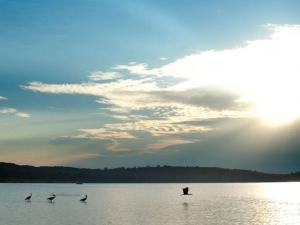
Uganda's hotels hopeful of recovery in 2021
With the catastrophic toll of the Covid-19 pandemic, 2020 has been the darkest and longest year in the recent history of Uganda’s hotel sector. Now, more than 250 Ugandans have died, and 33,000 infected, and many sectors of the economy have been sent into a tailspin.
“In 2020 the hotel business in Uganda performed like elsewhere in the world — badly,” said Jean Byamugisha, chief executive of the Uganda Hotel Owners Association (UHOA). “We had 80 percent cancellations of bookings, and also sent home about 57 percent of our staff on unpaid leave. This situation was made worse by the ongoing 2021 General Election campaigns, which compelled many countries to issue travel advisories against Uganda.”
But as the curtains came down on 2020, there was a spark of hope. After staying at home since the pandemic took hold at the start of the year, many Ugandans travelled over the festive season to bid farewell to a drab 2020, with a change of scenery, which led to a sharp rise in demand for hotel rooms.
The Ssese Islands, a scenic 84-island archipelago located in Lake Victoria, 51 kilometres from Entebbe, was the biggest attraction for local holidaymakers, with many hotels there reporting a 100 percent occupancy rate.
“Our hotel has been fully booked up to January 4, 2021. Having missed Easter and Eid festivities, many people have not gone on holiday for almost a year now, hence the current overwhelming thirst for vacations,” Emmanuel Bunanukye, who runs the picturesque Victoria Forest Resort on the Ssese Islands, said a few days before Christmas.
According to Bunanukye and other hoteliers who own properties on Ssese, during the festive season holidaymakers explored local attractions due to the Covid-19 travel restrictions that made it difficult for them to travel to holiday spots that are usually popular such as Mombasa, Dubai, Diani and Zanzibar.
Return to normalcy
But even though there was a semblance of a return to normalcy as 2020 came to a close, the hotel industry looks set to remain in uncharted territory until the second half of 2021 when meaningful, consistent recovery is expected.
“The situation still looks grim since our major source markets are going through a second wave of Covid-19 that some people say will be worse than the first one,” said Byamugisha.
Britain is one of the main source markets for Uganda's hospitality sector.
Even though there are approved Covid-19 vaccines, Byamugisha and other industry players predict a slow recovery in the new year. “We expect to see an upward turn, should all go well, starting June 2021 at the very earliest,” she said.
Rahul Patidar, proprietor of Saffron Beach Bistro, a boutique hotel on the shores of Lake Victoria in Entebbe, shares similar views: “With the Covid-19 vaccine news, demand is slowly growing and we hope to be back to normal business with boosted sales in the next financial year.”
But even before the distribution of the Covid-19 vaccine reaches Uganda, Byamugisha says that travellers should feel safe staying in hotels for now because “all Ugandan hotel employees have received rigorous training in Covid-19 SOPs,” she says. “Hotel guests should feel safe in the knowledge that health measures are in place to protect them.”
A trip to the future
For many, 2020 will be remembered as the year when everything changed. Now 2021 is a time to continue to adapt to living with Covid-19.
According to Susan Muhwezi, the chair of UHOA, Uganda’s hotel sector has lost an estimated $320 million in business since the country first went into lockdown in March 2020 due to Covid-19.
Some patterns that were formed in 2020 will continue through 2021 and beyond, industry players say. For example, the emphasis on cleanliness and a focus on health measures.
“The way hotels operate could change forever. For instance, some Covid-19-related SOPs such as guests washing hands and sanitising before entering hotel premises could become a staple throughout 2021 and beyond,” Patidar said.
Domestic market
And then there is domestic travel, which is expected to continue outpacing international travel.
“We will continue relying on the domestic travel market until around July 2021 when most people around the world have been immunised against Covid-19. That’s when we shall begin having a mix of both local and international hotel guests. Until then, most people will not have enough confidence and trust in destinations to travel freely,” said Rashid Kiyimba, proprietor of Brovad Sands Lodge on Ssese Islands and Brovad Sands Tours & Travel in Kampala.
However, Byamugisha says that even though domestic travellers have contributed greatly in keeping Uganda’s hotel sector afloat during the pandemic year, local travellers can only help hotels to break even, as international travellers, who are the big spenders, turn a profit.
Perhaps this explains why, among the many lessons most hoteliers – and the wider travel industry players – have learnt from the pandemic, is the need to diversify their product and service offerings.
“The main takeaway from 2020 and the Covid-19 pandemic is that we should learn to invest in other industries as well – and to always save for a rainy day. When it rains in tourism, we can Brovad Sands Lodge’s Kiyimba said.
